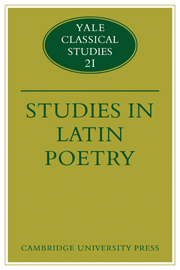Book contents
- Frontmatter
- Contents
- The Saturnian Verse
- The Menaechmi: Roman Comedy of Errors
- Imperator histricus
- Nine Epigrams from Pompeii (CIL 4.4966–73)
- Obscura de re lucida carmina: Science and Poetry in De Rerum Natura
- Catullus 64 and the Heroic Age
- Bacchus and the Horatian Recusatio
- Two Horatian Proems: Carm. 1.26 and 1.32
- Ovid and the Law
Bacchus and the Horatian Recusatio
Published online by Cambridge University Press: 10 January 2011
- Frontmatter
- Contents
- The Saturnian Verse
- The Menaechmi: Roman Comedy of Errors
- Imperator histricus
- Nine Epigrams from Pompeii (CIL 4.4966–73)
- Obscura de re lucida carmina: Science and Poetry in De Rerum Natura
- Catullus 64 and the Heroic Age
- Bacchus and the Horatian Recusatio
- Two Horatian Proems: Carm. 1.26 and 1.32
- Ovid and the Law
Summary
Horace is like the other Augustan writers in contriving to combine extravagant compliment to the emperor with protests of inability to cope with the magnitude of such a theme. But Horace's handling of the rhetorical recusatio is unusual if not unique in extent and complexity. Most writers pay the compliment and make the disclaimer in a single poem, or, if the need arises to repeat the process, it is undertaken afresh in a new idiom and different metaphor. This is usually the end of the matter. The poet has met his obligation and can now proceed with his work in his chosen genre with a clear conscience and unpreoccupied. It is otherwise with Horace. While there are few poems in which he explicitly couples the laudes Augusti with protests of inability to undertake political epic, Horace continually reminds the reader that he is nagged by a feeling of obligation unfulfilled. Very early in the Odes, however, it becomes clear that the poet's dilemma is not merely the conventional literary frustration of the feeble genius confronted by the colossal theme. All three books of the Odes are solidly provided with encomia of Augustus. Side by side with these, however, and nearly engulfing them is the series of poems that directly or indirectly attack the growing depravity of the Roman people. These invectives vary in intensity but are ranged with a crescendo effect.
- Type
- Chapter
- Information
- Studies in Latin Poetry , pp. 193 - 212Publisher: Cambridge University PressPrint publication year: 1969

